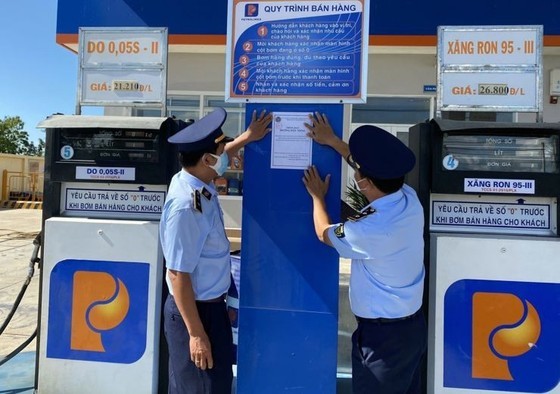 |
Inspectors from the Vietnam Directorate of Market Surveillance will pay unexpected checks to stores to prevent hoarding of gasoline (Photo: SGGP) |
In an effort to prevent speculation and the recurrence of hoarding goods to push prices during the holiday, the Minister of Industry and Trade has just instructed the market surveillance force in localities across the country to suddenly inspect businesses and throw the book at facilities that have been hoarding goods to push prices for enormous profits.
According to regulations, gasoline prices will be adjusted periodically every 10 days on September 2. However, September 2 is the national holiday, so the gasoline price adjustment will be postponed until after the holiday.
The Ministry of Industry and Trade reported that domestic gasoline prices have increased 5 times within the past 2 months while the world petroleum market is still developing unpredictably. This can affect the retail price of gasoline and the supply of gasoline to the domestic market.
The European Union's ban on Russian refined oil products and the decision by OPEC+ to keep production restrictions in place can have an impact on gasoline prices. Plus, high inflation prompted many major economies to continue to pursue tight monetary policies and apply high interest rates to cope with inflationary pressures. The US’s fuel reserves have dropped sharply.
To avoid the recurrence of speculation for increased prices as in previous years, the Ministry of Industry and Trade issued a directive to strengthen and improve the efficiency of the state management of petroleum and ensure the supply of gasoline.
Accordingly, the Minister of Industry and Trade requested the Domestic Market Department to monitor the implementation of the minimum total petroleum source in 2023 for wholesale petrol and oil traders.
If necessary, the Ministry of Industry and Trade will adjust the allocation of the minimum total petroleum source, specify the schedule for importing or purchasing domestic gasoline, and assign additional import quotas to some traders to ensure supply in all situations.
The Oil, Gas and Coal Department was assigned to closely monitor the production of two domestic oil refineries, ensuring adequate supply of petroleum to the market according to the registered plan. The Department must report to the Ministry for timely measures when the two plants stop operating for maintenance that can affect their output.
The Vietnam Directorate of Market Surveillance continues to strictly implement instructions on strengthening inspection and issue harsh penalties for violating petroleum business.
The Ministry of Industry and Trade required key petroleum traders to be responsible for fully implementing the minimum petroleum resources assigned in 2023.
The Ministry ordered not to let the supply of petroleum from wholesalers, distributors to retail businesses interrupt. There must be enough supply for retail stores by all means to maintain regular sales activities, as per the Ministry’s directive.
To avoid supply interruptions from manufacturers, the Ministry of Industry and Trade recommended that distributing businesses have close commitments with domestic petroleum producers in contracts between the parties. The commitment will include sanctions if one of the parties violates.
The Ministry of Industry and Trade also assigned the Department of Science and Technology to coordinate with relevant units to review and evaluate the overall implementation of Circular No. 43/2015/TT-BCT regulating gasoline wastage rates in petroleum business activities. Moreover, the Department should evaluate the implementation of Decision No. 49/2011/QD-TTg stipulating the roadmap for applying emission standards to newly manufactured, assembled and imported cars and two-wheeled motorbikes.
























